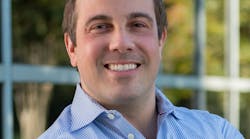The leaders of U.S. Xpress Enterprises Inc. on Monday fired the president of the fast-growing digital truckload business they view as their main growth platform for the coming years.
Cameron Ramsdell joined Chattanooga-based U.S. Xpress in the spring of 2019 after working more than a decade at UPS-owned Coyote Logistics, where he rose to chief technology officer. With Variant, Ramsdell and U.S. Xpress have sought to duplicate the digital freight brokerage business model in the over-the-road environment, using various technology platforms and artificial intelligence tools to optimize drivers’ efficiency and boost utilization and yield.
The Atlanta-headquartered venture, which is drawing about $30 million per year in technology spending, launched with a pilot fleet in late 2019 and grew to about 700 trucks a year ago and 1,500 today. At that size, U.S. Xpress CEO Eric Fuller—who this fall said he thought the third quarter was an inflection point for the venture—and his team say Variant has annualized revenues of about $300 million. (By way of comparison, U.S. Xpress’ total Q3 revenues were $491 million.)
In a filing with the Securities and Exchange Commission, Fuller lauded Ramsdell’s “instrumental” work in setting up and growing Variant inside its parent company but also said the business can now be better integrated with the rest of U.S. Xpress’ operations.
“While scaling Variant, we see multiple opportunities for collaboration with subject matter experts in our other operations to improve the value proposition for customers and gain other efficiencies,” Fuller said in the company’s SEC filing. “I am confident the team will be stronger than ever and be better positioned to work collaboratively and consistent with our culture across the enterprise.”
Ramsdell, who also had been president of US Xpress’ broader OTR business since September of last year, could not be reached for comment on his departure Monday.
Brad Carmony, vice president of brand communications at U.S. Xpress, said firing Ramsdell “was done in the best interest of the long-term future” of U.S. Xpress but declined to elaborate on Fuller’s remarks about intra-company collaboration or Ramsdell’s relative interest in such projects.
The decision to terminate Ramsdell doesn’t appear to have been long in coming: As recently as Dec. 2, Fuller spoke at an investor conference hosted by investment bank Stephens Inc. about Variant’s business model and its rapid growth since the two men spoke ahead of Ramsdell joining U.S. Xpress.
“One of the things he asked me was, ‘What is the ultimate goal?’ and I said, ‘The ultimate goal would be full cannibalization of our legacy model, that we have built a model that is far superior to anything that we have ever had or maybe even that the industry has had,’” Fuller said. “We believe that, where we stand today, that we’ve done that.”
No one has yet been named to take Ramsdell’s place at the helm of Variant and Carmony said it may be a little while before that person arrives.
“Now that Variant is up and running successfully, our senior leaders will take some time to identify what specific traits and skills will be ideal for the fleet’s next leader,” Carmony said. “Once there is a good understanding of what we’re looking for, we’ll begin a search for the right person.”
Investors aren’t enthusiastic about the removal of Ramsdell. Shares of U.S. Xpress (Ticker: USX) were down more than 12% to about $5.30 on the afternoon of Dec. 13. Over the past six months, they have lost more than 45% of their value.




